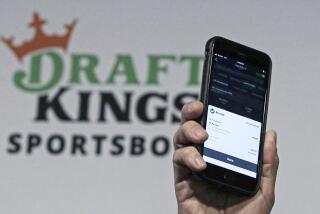Rozelle Says He’s Ready to Impose Drug-Testing Plan on NFL Players
- Share via
RANCHO MIRAGE, Calif. — An increasingly impatient Pete Rozelle, commissioner of the National Football League, said Monday that he is prepared to institute his own league-wide drug program, including random testing, if a suitable agreement can’t be reached between management and the players’ union by the start of summer training camps.
His remarks were immediately challenged by Dick Berthelsen, legal counsel for the National Football League Players Assn., who said:
“Commissioner Rozelle does not have the authority to impose random testing. Any effort to do so would be against the collective bargaining agreement. He can’t change its terms by unilateral action. We already have a policy, and it can’t be changed at all.”
Berthelsen also said that almost three-fourths--72.5%--of the association’s members have indicated they are against random testing and hinted that the NFLPA would consider legal action if such testing was unilaterally imposed by Rozelle.
Rozelle, seemingly unimpressed with those possibilities, said that although he hopes for a settlement between management and union, he is ready to impose his own program if necessary.
“All I’m saying is that I’m hopeful that they agree, that I can work with them to getting an agreement,” Rozelle said. “If I can’t, I may have to take other steps unilaterally. They (NFLPA members) would have the right to do whatever they saw fit. But I hope it doesn’t come to that.
“I would say this, it’s important enough, whether I had legal assurance or otherwise, I would think it’s sure worth a shot.”
Rozelle said he already has spoken with Gene Upshaw, the executive director of the NFLPA, and Jack Donlan, who is the chief negotiator for the league’s Management Council, about the possible drug program. In essence, he has told them he will act if they don’t.
But Mark Murphy, assistant executive director of the NFLPA, said Monday that the union would definitely take legal action if Rozelle proceeded despite union objections. “Without a doubt, we’d go to the NLRB (National Labor Relations Board),” Murphy said.
“The shame of all this is that it’s become a public relations contest between Rozelle and (baseball Commissioner Peter) Ueberroth,” Murphy said. “Rozelle feels as though he has to do something to keep up with him.”
Under the present collective bargaining agreement, which will expire after the 1986 season, teams can test a player for drugs in a preseason examination and also if a team physician believes there is reasonable cause.
A third examination at season’s end is being challenged by the NFLPA. The league says such a test is allowable within the agreement. The NFLPA disagrees, arguing that further testing compromises the original collective bargaining agreement and constitutes an invasion of privacy.
On Monday, Rozelle said that privacy isn’t an issue--”I don’t buy the argument”--and added that the league’s economic future rested on how soon a more comprehensive drug program could be put into place.
Said Rozelle: “I told Gene, I said, ‘To my mind, it’s not a public relations problem, it’s a problem that should, forgetting all other reasons--humanitarianism, altruism, so forth--it’s a problem that can directly in time, if not sooner, affect the income thAt comes into the National Football League. Now that isn’t a public relations problem. That is a firm economic possibility. I’m talking about attendance in games and I’m talking about sponsors for our telecasts.
“When (Upshaw) mentioned to me the possibility that, well, it was a public relations problem, I told him, ‘I don’t view it as that. I view it as a damn serious, potential economic problem that can affect players and everyone who derives their income from the game.’ ”
Just minutes before Rozelle addressed reporters, Mike Ditka, coach of the Super Bowl champion Chicago Bears, said that he knew of at least one player on his team who had a drug problem. Ditka wouldn’t disclose the name of the player but did say that steps were being taken to alleviate the problem.
NFL Notes Asked how he felt about random testing for drugs, Mike Ditka hesitated for a moment, but then warmed quickly to the question: “If you have a product that you’re proud of, then you keep that product as clean as possible. If that means that you have to test mandatory, then I think you do it. I’d get in line first every week, every day, whenever it has to be done. I think everyone else in our organization would, too. I don’t feel that it’s an infringement on my private rights. My private rights don’t mean a whole heck of a lot if the game of football weren’t there. I owe everything I have to football, as do most of the people playing the game. Football does owe some things to some of the people because of their contributions. But I think that’s a cop-out to say that’s an invasion of your private rights.”
More to Read
Go beyond the scoreboard
Get the latest on L.A.'s teams in the daily Sports Report newsletter.
You may occasionally receive promotional content from the Los Angeles Times.










